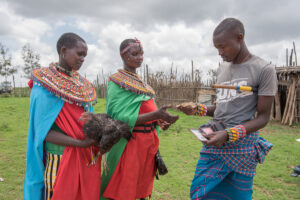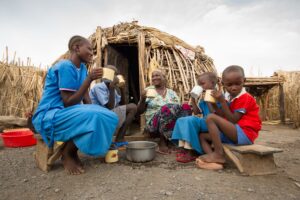According to a UN report, Africa is the world’s youngest continent, with 60% of its population under the age of 25. However, many economies struggle to accommodate the influx of young individuals entering the workforce, leaving 10-12 million youths to compete for only 3.1 million jobs created each year. In Kenya, despite overall economic growth, almost 40% of young people, or 5.3 million youths, remain unemployed. Youth unemployment thus represents a significant factor in the persistence of extreme poverty and puts millions at risk of radicalization.
BOMA aims to address this crisis by adapting the poverty graduation approach to address the needs of vulnerable youth in the rural areas of Marsabit and Isiolo. In both counties, over 50% of young people are unemployed, and the lack of economic opportunity has led to an increase in radicalization. As transit points for those traveling to Libya and Somalia, Al Shabaab and ISIS have exploited these regions to recruit around 200 youth over the past eight years.
BOMA is tackling the root cause of unemployment and radicalization through the Sustainable Entrepreneurship and Economic Development (SEED) Project for Vulnerable and Marginalized Youth in Northern Kenya. Officially launched this past July in partnership with Smart Regional Consultants (SRC), SEED aims to create sustainable youth employment through the establishment and maintenance of profitable enterprises.

Over the course of two years, BOMA will enroll 2,400 young men and women (age 18-34) and help them establish 800 enterprises. Participants will receive seed capital and assets to invest in viable startup businesses, training and mentorship on entrepreneurship, affordable and relevant business development services, and greater access to market and financial products.
The project will impact more than just participants, however. By running a business, receiving steady income, and gaining access to credit, loans and savings, the youth will be able to support more than 7,200 other household members. Their success within the program will also help shift their own perception and expectation of what is possible for themselves and will allow them to act as role models for their peers.

SEED represents BOMA’s first, and certainly not last, step towards ending extreme poverty and building resilience among younger populations. Ultimately, understanding how to overcome the challenges facing the youth of Northern Kenya will create a model that can be adapted to other contexts and can create sustainable and lasting change for youth throughout the drylands of Africa.
